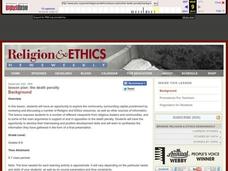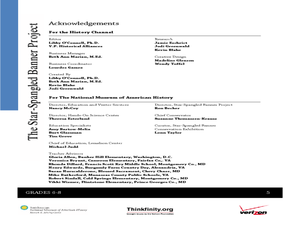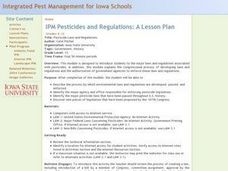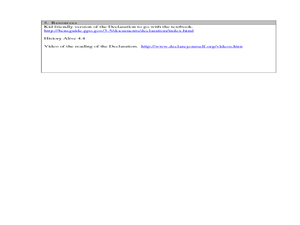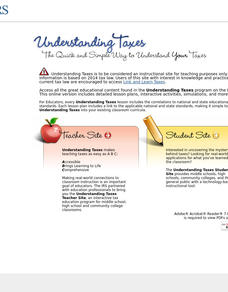Constitutional Rights Foundation
Driver’s Licenses And Unauthorized Immigrants
Should driver's licenses be granted to unauthorized immigrants? That is the question class members grapple with in a lesson that asks them to first read a fact sheet that details the arguments for and against licensing unauthorized...
Curated OER
African-Americans and the New Deal's Civilian Conservation Corps
High schoolers discover the responsibilities of the Civilian Conservation Corps. In this New Deal lesson, students analyze the impact that the inclusion of African Americans in the Civilian Conservation Corps made on race relations in...
Curated OER
Italian Enemy Aliens During World War II: Evacuation from Prohibited Zones
Students read and discuss the Enemy Alien Evacuation Order. They perform research by reading newspaper articles from February 1942 as well as investigating available information on the Internet. Students work in groups to create a...
Curated OER
The Monroe Doctrine: Whose Doctrine Was It?
Was James Monroe the sole contributor of the Monroe Doctrine? Young scholars study the doctrine and cite evidence to show contributions of John Quincy Adams and Thomas Jefferson in its formulation.
Curated OER
Wartime Posters
Students recognize that, America's eventual involvement in World War II, not everyone initially agreed that intervention was the answer. They conduct research about the political, economic, sociological, and historical factors in the...
Curated OER
The Death Penalty
Middle schoolers examine the controversy surrounding the death penalty. In this capital punishment lesson, students explore the ethical concerns and religious beliefs regarding the death penalty. Middle schoolers conduct research,...
Curated OER
Slave Culture during the Age of Jackson
Students consider slave culture during the time of Andrew Jackson. In this lesson on slavery, students watch a PowerPoint presentation, take notes, then analyze an extensive list of primary sources in order to understand what and how...
Center for Civic Education
What Does Returning to Fundamental Principles Mean?
Looking for materials for your Constitution Day and Citizenship Day lessons? Then check out this packet of activities that not only gets your class members thinking critically about the fundamental principles at the heart of American...
Curated OER
What is Meant by Returning to Fundamental Principles?
What did the Founding Fathers mean by the importance of continually returning to fundamental principles? Your young historians will analyze a series of quotations illustrating the fundamental ideals and principles of the...
Curated OER
Cartoons for the Classroom: Celebrating the 19th Amendment
Eighty-eight years after women earned the right to vote, a women ran for president. Young analysts consider the role women play in politics, how they are portrayed, the standards they are held to, and if they are still treated unfairly...
K12 Reader
Broken Promises
This comprehension activity asks readers to respond to a series of questions based on an article about the treatment of native peoples.
Constitutional Rights Foundation
The Cold War: How Did It Start? How Did It End?
What is the difference between a Cold War and a Hot War? Scholars research the beginning of the Cold War. They analyze diary entries as well as excerpts from various events during the 45-year standoff. To finish, they prepare final...
Curated OER
Destructive Impact of Environment on Artifacts
Young scholars recognize that artifacts are destroyed over time. In this environmental factors on artifacts instructional activity, students experiment and observe through the microscope to find the environmental impact on...
Curated OER
Pesticide Laws and Regulations
Students explore the laws and regulations of pesticides. For this pesticides lesson, students research how laws are made and identify the agencies responsible for enforcing the laws. Students research the Internet for laws and bills...
Curated OER
United States Pride
Third graders learn the responsibility of citizenship and learn facts about a state they choose to research.
Curated OER
Political and Cultural Road to the American Revolution
Learners examine the Declaration of Independence. For this Revolutionary War lesson, students use primary sources to analyze how the creation of the Declaration of Independence lead to the development of the United States as an...
Curated OER
Kids Get School Named for Obama
Students read about the renaming of a school for Barack Obama. In this political lesson, the teacher presents vocabulary words from the news article, then the students read the article and answer comprehension questions. Lesson includes...
National Park Service
Civil War to Civil Rights: From Pea Ridge to Central High
Explore how the Civil War impacted the Civil Rights Movement. Class members complete a series of projects for a unit that uses a layered curriculum approach to learning.
Curated OER
The Politics Of Taxation
Students explain that taxation involves a compromise of conflicting goals and that lobbyists can influence lawmakers' decisions about taxes. They can explain why people of similar incomes often pay different tax rates and work in teams...
National Endowment for the Humanities
Slavery and the American Founding: The "Inconsistency Not to Be Excused"
High schoolers examine slavery in the revolutionary and colonial eras of the United States. In this slavery lesson, students investigate the presence of slavery in early America, the language of the Constitution, and the intent of the...
National Endowment for the Humanities
George Washington: The Precedent President
Everyone knows that George Washington was the first president, but do your scholars know why that was so important? The lesson plan, the third in a sequence of three, allows learners to understand how George Washington set a precedent...
Curated OER
Little House in the Census: Almanzo and Laura Ingalls Wilder
How would you use census data from 1880-1900? Here are a set of ways you can incorporate the book Little House on the Prairie and US census data from that time period. Learners will research the validity or the book based on factual...
Curated OER
Lesson 6: Crowded Skies
This is a treasure-trove of multimedia resources to help your scholars analyze transportation methods. They discuss different forms of movement, utilizing several infographics to spur conversation deeper and get visual learners engaged....
Tennessee State Museum
An Emancipation Proclamation Map Lesson
Did the Emancipation Proclamation free all slaves during the Civil War? Why was it written, and what were its immediate and long-term effects? After reading primary source materials, constructing political maps representing information...







